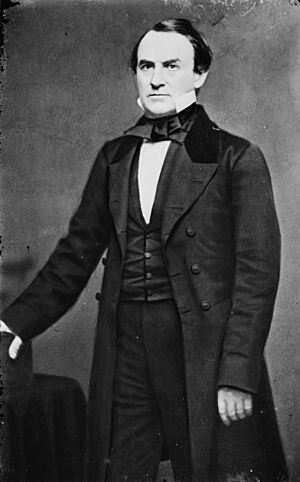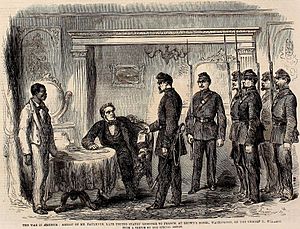Charles J. Faulkner facts for kids
Quick facts for kids
Charles James Faulkner
|
|
|---|---|
 |
|
| Member of the U.S. House of Representatives from West Virginia's 2nd district |
|
| In office March 4, 1875 – March 3, 1877 |
|
| Preceded by | John Hagans |
| Succeeded by | Benjamin F. Martin |
| United States Minister to France | |
| In office March 4, 1860 – May 12, 1861 |
|
| Appointed by | James Buchanan |
| Preceded by | John Y. Mason |
| Succeeded by | John Bigelow |
| Member of the U.S. House of Representatives from Virginia's 8th district |
|
| In office March 4, 1853 – March 3, 1859 |
|
| Preceded by | Alexander Holladay |
| Succeeded by | Alexander Boteler |
| Chairman of the Committee on Military Affairs | |
| In office March 4, 1857 – March 3, 1859 |
|
| Preceded by | John B. Weller |
| Succeeded by | Benjamin Stanton |
| Member of the U.S. House of Representatives from Virginia's 10th district |
|
| In office March 4, 1851 – March 3, 1853 |
|
| Preceded by | Richard Parker |
| Succeeded by | Zedekiah Kidwell |
| Member of the Virginia House of Delegates from Berkeley County | |
| In office December 4, 1848-December 2, 1849 |
|
| Preceded by | James E. Stewart |
| Succeeded by | Allen C. Hammond |
| Member of the Virginia Senate from Berkeley, Morgan and Hampshire Counties | |
| In office January 1, 1838–1842 |
|
| Preceded by | William Donaldson |
| Succeeded by | Thomas Sloan |
| In office December 5, 1831- December , 1833 |
|
| Preceded by | Thomas Davis |
| Succeeded by | Edmund P. Hunter |
| In office December 7, 1829-December 5, 1830 |
|
| Preceded by | Joel Ward |
| Succeeded by | Levi Henshaw |
| Personal details | |
| Born | July 6, 1806 Martinsburg, Virginia, U.S. |
| Died | November 1, 1884 (aged 78) Martinsburg, West Virginia, U.S. |
| Political party | Democratic |
| Other political affiliations |
Whig |
| Spouse | Mary Wagner Boyd |
| Children | 5, including Charles James Faulkner |
| Relatives | Harry F. Byrd (great-grandson) |
| Profession |
|
| Military service | |
| Allegiance | Confederate States of America |
| Branch/service | Confederate States Army |
| Rank | |
| Battles/wars | American Civil War |
Charles James Faulkner (born July 6, 1806 – died November 1, 1884) was an important American politician and lawyer. He was born in what was then Martinsburg, Virginia, which is now part of West Virginia. Faulkner served in both the state government of Virginia and later as a U.S. Congressman. He also worked as a diplomat and soldier during a very important time in American history.
Contents
Early Life and Family
Charles J. Faulkner was born in Martinsburg, Virginia, in 1806. His father, James Faulkner, came from Ireland. His father was a military commander during the War of 1812. Charles's parents passed away when he was young.
Even so, he worked hard and graduated from Georgetown University in Washington, D.C., in 1822. He then studied law and became a lawyer in Virginia in 1829. He married Mary Wagner Boyd. Her father, Elisha Boyd, gave them the "Boydville" estate as a wedding gift. Charles and Mary had five children: three daughters and two sons. Both of their sons, Charles James Faulkner (Jr.) and E. Boyd Faulkner, also became soldiers and later held important jobs in politics and law.
Career Highlights
Charles Faulkner was a lawyer and also managed a farm where he used enslaved workers. He was very interested in helping his home area, Berkeley County, grow and improve.
He was a member of the Whig Party, a major political group at the time. He believed in building better roads and canals, like the National Road and the Chesapeake and Ohio Canal, which helped connect different parts of the country.
A Life in Politics
Faulkner began his political career when voters in Berkeley County elected him to the Virginia House of Delegates in 1829. This was a part of Virginia's state government. In his first speech, he spoke about the idea of slowly freeing enslaved people. He also helped settle a border disagreement between Virginia and Maryland.
Later, in 1838, he was elected to the Virginia State Senate, another part of the state government. He served there for several years. In 1848, he returned to the House of Delegates. There, he helped create a law that became a model for the Fugitive Slave Act of 1850. This law made it harder for enslaved people to escape to freedom.
In 1850, Faulkner was chosen to be a delegate for the Virginia Constitutional Convention of 1850. This was a special meeting to write new rules for the state of Virginia. He strongly supported giving more people the right to vote. He also wanted fairer taxes, especially for people who did not own enslaved workers.
Faulkner was also elected to the United States House of Representatives in 1850. He served in the U.S. Congress from 1851 to 1859. He started as a Whig, but when that party ended, he joined the Democratic Party. In Congress, he led the Committee on Military Affairs, which focused on military issues.
Diplomat and Soldier
In 1860, President James Buchanan appointed Charles Faulkner to be the U.S. Minister to France. This meant he was America's top representative in France. He served until the American Civil War began in 1861.
When he returned to the U.S., he was arrested in August 1861. People thought he was trying to buy weapons for the Confederacy while in France. He was held in different prisons. Eventually, he was released in December 1861 as part of a prisoner exchange.
Soon after his release, Faulkner joined the Confederate Army. He became a lieutenant colonel and worked for General Stonewall Jackson. During the Civil War, his hometown of Martinsburg changed hands many times between Union and Confederate forces. His two sons also became Confederate officers.
His wife and daughters stayed at their home, "Boydville." In 1864, Union soldiers planned to burn their home because it belonged to a Confederate officer. But Faulkner's wife bravely stood up to them. She explained that the house was her property and built by her father, a hero from the War of 1812. Her nephews, who supported the Union, also helped. Because of this, the house was saved.
After the War
After the Civil War ended, Charles Faulkner faced challenges. He refused to promise loyalty to the United States right away. It was difficult for him to get his law license back.
He started working for railroad companies, helping them rebuild after the war. He also argued a very important case for West Virginia in the U.S. Supreme Court. This case, called Virginia v. West Virginia, was about which state Berkeley and Jefferson counties belonged to. The court decided in 1871 that they would remain part of West Virginia.
In 1872, voters in Berkeley County elected Faulkner to the West Virginia Constitutional Convention. This meeting was held to write a new constitution for the state of West Virginia. He played an important role there.
In 1877, Faulkner led the state militia to try and stop a protest by railroad workers in Martinsburg. The workers were upset about pay cuts. There was a conflict, and one person died. The governor eventually called in federal troops to help restore order. This protest grew into the larger Great Railroad Strike of 1877.
Faulkner was elected back to the U.S. House of Representatives for West Virginia in 1874. He served from 1875 to 1877. He tried to become a U.S. Senator in 1876 but did not win. He continued to practice law until he passed away.
Death
Charles J. Faulkner died at his family home, "Boydville" near Martinsburg, on November 1, 1884. He was buried in Old Norborne Cemetery in Martinsburg. His son, Charles James Faulkner, later became a U.S. Senator for West Virginia. His great-grandson, Harry F. Byrd, became a very influential politician in Virginia in the 20th century. Historical documents about the Faulkner family are kept at the West Virginia State Archive.
Images for kids
 | James Van Der Zee |
 | Alma Thomas |
 | Ellis Wilson |
 | Margaret Taylor-Burroughs |



